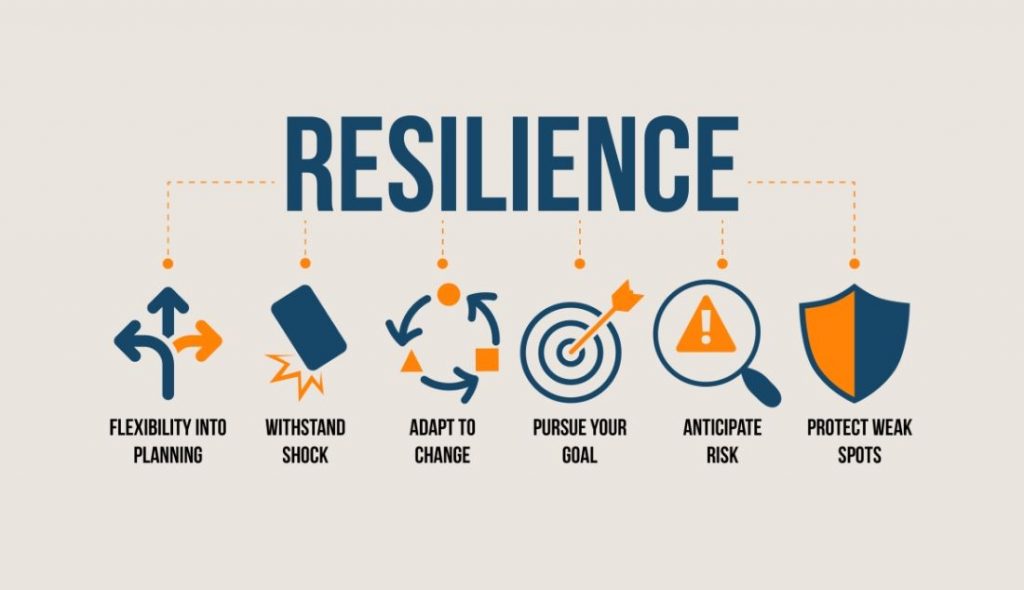
Do you need help on becoming more resilient?
Don’t despair. Growing a life coaching business can be challenging for sure and to help you have the best chance at success as possible, I have put together these 7 tips on developing resilience.
As the force behind your coaching business building journey, you need to work on developing resilience. In positive psychology, resilience is the quality of being able to deal with challenges and setbacks graciously. Resilient people cope better with problems, stress and difficulties, whereas people lacking in resilience buckle under pressure.
As business, by its very nature, is turbulent, you need a resilient mind to keep the positivity flowing. Difficulties and misfortunate are inevitable, but it’s up to you how you handle them. Resilient people still feel stress, anxiety, trauma and all types of emotional pain, but they are able to move forward in the face of these feelings.
Resilience is a trait that can be learned. Becoming resilient involves changing your thinking patterns and your behavior. Firstly, you need to learn how to make realistic plans and strategies when faced with a challenge. Having a plan makes dealing with difficulties more manageable, and being realistic helps you to make plans successful.

Unlike positive thinking, self-compassion, or gratitude — which can all be developed when things are going good or going bad — you need challenges in your life to develop resilience. You have to get knocked down in order to learn how to pick yourself back up. Over time, you’ll start to see that being knocked down makes you stronger — plus it makes you less afraid to get knocked down again.
Not sure if you approach challenges in the ways that build resilience? Maybe you have room to grow and become a more resilient person. To find out how resilient you are, take this super-short well-being quiz, which not only gives you a general idea of you how resilient you are, but can also help you identify the other skills you need to build to improve your happiness and well-being.
It can also help to use a framework called ‘me/always/everything’, developed by positive psychology expert Martin Seligman to help overcome negative thinking patterns that undermine resilience. Essentially, there are people who blame themselves for problems (me), believe that these problems are always his or her fault (always) and that these problems influence every aspect of their life (everything).
Naturally, the ‘me/always/everything’ type of thinking destroys self-esteem and resilience. If you believe that all problems are your fault, that they are always present and they have a huge impact on your life, you will panic and be distressed when a new problem arises.
To get over ‘me/always/everything’ thinking patterns, try the following:
- Take a moment to pause and look at the situation in a more objective and detached perspective.
- Stop purely looking for reasons why you are fault, but look at the situation at hand for possible explanations for faults and failures.
- Learn to recognise when you are successful and cherish even the small triumphs, as doing this will make you realise you are not always creating problems.
- Recognise when you have control over a situation or a choice and this will help you feel like the problems in your life are not out of control or beyond hope.

1. Know your own strengths and utilise them
Everybody has their own strengths and weaknesses in all they do. The secret is to recognise them in yourself and focus on using them. Most resilient people you’ll find will utilise their own strengths especially in business and outsource their weaknesses or activities they would prefer not to do. Consider taking the strength character test to see what your strengths are here.
2. Be proactive and see what needs fixing before it happens
Be the type of person that can adapt to change quickly and learn to become a problem solver in any situation. Try to recognise a problem before it occurs and attempt to fix it straight away otherwise you could find yourself having to fix multiple problems after a snow-ball effect.
3. Don’t be afraid to ask for help
One of the best qualities you’ll find in successful people is that they are never afraid to ask for help. Get use to asking mentors or other successful people who have gone before you in your industry “Can you help me?” Drop the ego and seek support in others.
4. It’s okay to take a break
When you are too close to the problem in your life coaching business or maybe even your personal life, it’s great to take a mental break so you can step away from the problem for a while. Go and spend some time with friends or family, read a book, watch a movie or spend time on your favourite hobby to relax and unwind to shift your mind onto something else. This is a great thing to do if you are feeling overwhelmed, then when you come back to face the problem again you can look at things through a new perspective and lens.
5. Realise adversity is what makes you stronger
People who face some adversity in their lives become stronger. Of course, it depends on a lot of other factors — how big is the adversity, how much support do they have, how did they cope — but by learning to cope with stress and having that experience, we gain confidence and we gain preparation. Focus on the resilience and see yourself as someone who is even better prepared for life than the average person because you’ve already lived so much of it.”
6. Find your polaris star
Your polaris star is your ‘true north’ in other words your WHY. Remember why you are building your business in the first place or other directions your life might be heading. Your polaris star is your mission, your grand vision which keeps pulling you closer and closer to your goals. Reflect on why you started your journey in the first place and this will help you to stay strong.
7. Practice daily affirmations to empower you
Having confidence in your own ability to cope with the stresses of life can play an important part in resilience. Research has shown that your own self esteem can play a very big role in coping with stress and recovering from traumatic events. Remind yourself daily how far you have already come. Posts some affirmations in places you can see around you. Build resilience by shutting out that negative self-talk in your head and replace with positive affirmations like “I am a powerful man/woman who can solve any problem that arises” etc





